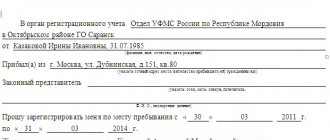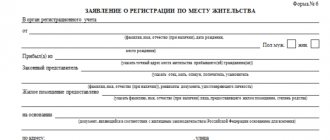Registration required
Registration, which is more often called propiska among citizens, is a notification from the state about the address at which a person intends to reside permanently. At the same time, there is a fundamental difference between these two concepts, but today they are interchangeable.
In accordance with current legislation, every citizen of Russia must register, and in particular, this obligation is spelled out in Government Decree No. 713.
The need to register is provided for by the need to create conditions in order to fully realize the rights of all citizens, as well as fulfill their obligations to the state and other persons.
Can a husband register his wife without the consent of other registered
According to current legislation, registration in itself does not give rise to legal rights to housing and is not the basis for acquiring ownership rights; it is only a notification procedure. Therefore, the consent of the persons registered in the apartment for the owner to register his or her spouse is not required.
The answer to this question depends on what status the spouse has in relation to the housing in which he wants to register the second spouse, what form of ownership the apartment is in: municipal or private, and whether the registered persons are co-owners of the apartment or they do not have any rights to it.
27 Aug 2020 lawurist7 261
Share this post
- Related Posts
- Can Rags Be Seized?
- Can Wives Block Gas Debt Bills If the House Owner's Husband Died?
- What services do up to 35 l purchase an apartment help young families
- Benefits for paying for garbage in the Oryol region
Rules of law
Freedom of movement and choice of place of residence is provided for by current legislation, and in particular, it is spelled out in the Constitution, which makes it absolutely guaranteed. At the same time, the procedure in accordance with which citizens are registered at their place of residence is established by Law No. 5242-1, issued on June 25, 1993.
The obligation of citizens to be assigned to a specific place, that is, to have permanent registration, is indicated in Government Decree No. 713, which was issued on July 17, 1995.
The concept of shared ownership of real estate is established in accordance with paragraph 2 of Article 244 of the Civil Code, and the responsibility that is imposed on citizens in the absence of registration is specified in Article 19.15.1 of the Code of Administrative Offenses.
Does a husband have the right to register his wife without the consent of other owners?
Registration of a child is mandatory for a kindergarten or school, and receipt of social assistance is tied to it (according to Article 20 of the Civil Code of the Russian Federation, a minor must be registered at the place of registration of the mother (father)). The need to register temporarily most often arises when renting housing for a period from 90 days to five years.
Just a few years ago, the law prohibited the registration of other citizens in housing transferred under a social tenancy agreement. The same rules applied to shared real estate applied to such property. In other words, only young children could be registered on the premises without the owner’s permission.
This is interesting: What can the bailiffs take out of the apartment if the debtor on the loan is a son?
Registration in shared ownership
The current legislation does not include any mandatory conditions regarding the fact that registration is provided only for any real estate that has only one owner, since in the vast majority of cases the privatization procedure for municipal property provides for the registration of several owners at once. The same type of ownership sufficiently appears in the event that real estate is given as a gift or an item of inheritance.
Common property also appears if a family buys its own home using funds received from maternity capital. Thus, it is possible to register a property that is in common ownership, but to do this, several important subtleties will need to be observed.
On the possibility of registering a person in an apartment without the consent of other homeowners
For the temporary registration of a child, the consent of the registered owners is also not required. It is necessary to register if the family stays in another city for more than 90 days. Please note that when renting housing under temporary registration, you can stay in another place for up to five years. If the spouses have a child, then he will need to be sent to kindergarten or a general education institution. And for this you need at least temporary registration, for which it is not necessary to have shares in the home.
This is interesting: Chernobyl Payments for the Second Child Zheleznogorsk
We have already sorted out the question of whether one of the owners of a home can register an identity without the consent of the registered owners. Now it’s worth remembering what documents are required in order to carry out this procedure. Again, you should not start only if it is permitted by law not to ask permission when there are at least 2 owners.
Registration in an apartment in shared ownership
Registration in an apartment in shared ownership for non-owners has a number of nuances. This is due to the special legal regime of such an apartment.
The law states that the disposal of housing, including the decision to register new residents in it, is carried out jointly by all owners.
However, none of them has an advantage, even if its share is larger than the others.
In a private house
Registration in a private house, which is owned by several citizens, depends on how exactly it is divided:
- If everyone owns an isolated room with a separate entrance, analogous to an apartment, then you don’t have to ask the consent of your neighbors.
- If the house is divided only into shares, without specifying specific premises, then obtaining consent is necessary.
Without agreement
Without the consent of all other owners, the owner himself can register in his living space. It does not matter which part of the apartment belongs to him and how many citizens are already registered.
For apartments that are privately owned, the standards for the provision of residential premises do not apply.
The second case when the consent of the co-owners need not be asked is when the child is registered with one or both parents.
Until the age of 14, until children receive a passport, they can only be registered at their parents’ living space. Even if other owners object to it.
Relatives
Registration of blood relatives, with the exception of children and spouses, requires obtaining the consent of all participants in shared ownership.
It does not matter whether a relative is such for all owners or not. But anyone can register their child with them without obtaining consent.
Spouse
If the apartment is divided into parts, as lawyers say, in kind, and each co-owner is allocated a separate room, then they can register spouses in it only at their own request.
But such an apartment is already communal.
And with ordinary shared ownership, in order to register a wife or husband as their share, the consent of all owners will be required.
Unauthorized persons
It is possible to register a stranger in an apartment in shared ownership. If you follow the main rule - obtaining the consent of all adult capable owners.
Registration does not give such a tenant ownership rights.
He can only live in the apartment and use utilities on the same basis as other residents.
If the co-owners are against
There are exceptions to the rules established by law. The law defines when it is possible to register a spouse in an apartment with shared ownership without the consent of other owners.
So, if the apartment is divided into parts, each of which is allocated in kind, and all co-owners have separate rooms, then you can easily register it for your share without the consent of other shareholders.
He does not need not only the presence of the co-owners during registration, but even their written or oral consent.
The same rules apply to the owner’s children, who can also be registered in the parent’s living space.
If not only co-owners of the property, but also members of their families or other citizens are registered and live in an apartment in shared ownership, only those who have a share in the common property have the right to vote in the disposal of such housing.
There is no reason to doubt whether a shared owner can register a person in an apartment if only the residents registered there express disagreement. Their opinion is not taken into account when registering.
The legislation allows registration without the consent of the other co-shareholders if the person being registered is a minor child of the share owner or the owner himself plans to register. Also, without consent, the procedure can be carried out with a share allocated in kind, which is a separate dwelling.
It is not always possible to obtain a positive result of a dispute by studying the issue in detail. Free consultation from a lawyer, which can be obtained through
online form
or by phone at
Moscow
7 ext. 532 and
St. Petersburg
7 ext. 532 will help resolve your problem.
In other situations, if the owners disagree, there are 2 options for further action.
- Allocate property in kind. This method is optimal if the subject of the dispute is a premises that has separate living rooms. It is necessary to be able to carry out redevelopment so that exits and communications are non-intersecting.
- Sell or donate part of the share to a person who intends to register in it. In the case of a sale, one should take into account the fact that the shareholder has the right of first refusal, that is, he can agree to the offer to buy the property. When registering a deed of gift, the consent of the owners is not required. The disadvantage of this method is the following: the new owner of the share acquires the legal right to dispose of it as he pleases.
In the latter case, it is necessary to take into account the fact that if the donation was not made for relatives, then you will need to pay 13% personal income tax on the price of the transferred property. In a situation where the donation covered the purchase and sale transaction, the remaining co-shareholders have the right to initiate legal proceedings, as a result of which the transaction will be recognized as a sham and terminated.
Is registration (propiska) required in Russia?
The main legal act reflecting the features of registration of citizens of the Russian Federation is Law No. 5242-1 of June 25, 1996 “On the right of citizens of the Russian Federation to freedom of movement, choice of place of stay and residence within the Russian Federation” (hereinafter referred to as the Law). According to Art. 3 of the Law, Russian citizens are required to register at their place of temporary residence or place of residence. Control over the implementation of registration is entrusted to the internal affairs bodies.
Where can I register?
Registration at the place of residence implies a link to a property located at a specific address. According to Art. 2 of the Law, such an object can be a residential premises . According to Art. 15 of the Housing Code of the Russian Federation, the “residential” category includes isolated real estate suitable for living in accordance with sanitary and technical standards. From this point of view, a share in an apartment is an object suitable for registration.
Temporary registration at the place of residence is possible in any premises that are suitable for residence and serve as a place of temporary residence for a citizen, even if it is not residential.
This includes:
- hotels;
- sanatoriums, holiday homes, boarding houses, tourist centers, campsites;
- health care organizations;
- places of detention.
You can also temporarily register as a shareholder in an apartment if living in it is temporary.
Deadlines for mandatory registration, liability for violation
Registration deadlines are established by Art. 5, Article 6 of the Law:
| Deadlines, liability for violation | Registration at the place of stay | Registration at place of residence |
| Deadline for applying to the MFC, the Department of Internal Affairs at the Ministry of Internal Affairs or the “passport office” | Having arrived at the place of temporary stay, you need to register within a period not exceeding 90 days . If the residential premises are located in the same locality as the permanent registration, there is no need to undergo temporary registration. | If you change your place of residence, you need to contact an employee of the UVM department within 7 days. |
| Removal from previous place of registration | Not produced. | In production. You can deregister yourself. certificate No. 7 is issued at the previous place of registration to be presented at the new place of registration. It is also possible to simultaneously withdraw and register at a new place of residence. |
| Deadline for registration with government agencies | No later than 3 working days from the date of submission of documents to the registration authority. When sending an application and accompanying documents in electronic form, the period increases to 8 days. | No later than 3 days. If the property is registered in Rosreestr, and the owner has not presented a document providing grounds for moving into the residential premises, an employee of the registration authority requests information from Rosreestr independently, and registration is carried out within 8 working days from the date of submission of documents: applications for registration at the place of residence, certificates personality. |
| Fine | According to Art. 19.15.1 Code of Administrative Offenses of the Russian Federation, fine for violating the terms of mandatory registration both the owner of the premises and the unregistered citizen will pay. The amount will be:
The fine is not paid in the following cases:
| |
In order to avoid liability for violation of the law, it is in the interests of the owner and the occupant to resolve the issue of registration within the established time frame (see “How long does it take to register?”).
Buying a share in an apartment no longer guarantees “registration”
Mikhail Tereshchenko/TASS
The minimum at which they will be allowed to register a non-family member in their “squares” will soon become the accounting norm for living space in the region. It will no longer be possible to make a “rubber apartment” out of property by selling a few meters each to dozens of sufferers. The State Duma may consider a bill aimed at combating cunning property owners in the first reading as early as May 22. The Chamber Committee on Housing Policy and Housing and Communal Services at its meeting on May 16 recommended adopting the document.
One fortieth part of the apartment - and you are a Muscovite
Advertisements for the sale of micro-shares in apartments are published without any hesitation on the websites of major real estate agencies. Thus, one-fortieth of an apartment in a residential area of Moscow is offered for 150 thousand rubles, and one-eighth at the opposite end of the capital is offered for 320 thousand. Such offers are primarily of interest to those who want to obtain a fictitious registration. Read on topic
The record holder for “stretching” an apartment was a resident of Yekaterinburg, who in 10 years built a real “rubber” business, registering almost 20 thousand foreigners. Only at the end of March, a criminal case was opened against the unfortunate entrepreneur under the article “Fictitious registration of a foreign citizen or stateless person at the place of stay in a residential premises.” And this despite the fact that law enforcement officers have known about the overcrowded apartment since the end of 2020.
“It was impossible to stop the registration of people, since the current legislation, paradoxically, does not contain a single reason for refusing registration at the place of residence,” explained the Sverdlovsk regional headquarters of the Ministry of Internal Affairs.
Alexander Sidyakin, First Deputy Chairman of the State Duma Committee on Housing Policy and Housing and Public Utilities.
. “For example, real estate fraud is carried out through acts of donation. Half of the thirty-meter apartment is taken, “split” into six parts and “given” to various idiots. Then each of them presents a certificate for 2.5 “squares,” the deputy told the Parliamentary Newspaper. He noted that in Article 10 of the Civil Code such actions are called “chicanosous,” that is, we are talking about abuse of rights.
You can’t sell less than the norm
Raiders, black realtors and overly enterprising owners should be prevented by amendments to the Housing Code, the Law “On the right of citizens of the Russian Federation to freedom of movement, choice of place of stay and residence within the Russian Federation” and the Law “On migration registration of foreign citizens and stateless persons in the Russian Federation” " Document by a group of State Duma deputies headed by Pavel Krasheninnikov
,
Galina Khovanskaya
and Alexander Sidyakin introduced into the chamber on December 21, 2020. Krasheninnikov and Khovanskaya have already withdrawn their previous bills on the same topic. Read on topic
If the changes come into force, a general rule will appear that a share in the common property will be formed only if the accounting standard for living space is observed. The amendments will also limit the owner’s right to move in third parties if, as a result, each person living in the premises will have less than the accounting norm.
“That is, if in Moscow it is 10 square meters, then dividing a 50-meter apartment into 10 parts will no longer work, maximum - into five. Of course, close relatives are exempt from this restriction and can be registered,” explained Alexander Sidyakin.
Joint ownership of an apartment by spouses, how to register
If housing is transferred to a legal entity, then it can use the residential premises only for citizens.
If an agreement between the owners is not reached, then they have the right to go to court, which must establish the procedure for paying for residential premises and utilities in proportion to the shares of ownership for each of the owners.
Participants in shared ownership are required to participate in the payment of taxes, fees and payments for housing and communal services in proportion to their share. They can determine who pays how much on their own, and if no agreement is reached, in the manner established by the court.
The possibility of forced payment of monetary compensation for his share is permissible by court decision in the case of the simultaneous presence of the following conditions: the share of the co-owner is insignificant, cannot be realistically allocated, the co-owner does not have a significant interest in the use of the common property.
Joint ownership of an apartment by spouses: registration, tips, examples
Housing is practically the most expensive asset that families own.
Depending on the financial situation of the future or existing family, different scenarios are possible both for registering real estate as joint property of the spouses and for its division in the event of divorce.
There is no need to argue about how to properly build relationships after a break in marriage.
In families built on true love and understanding, there is no urgent need to provide for all the nuances of property registration, but, as they say, forewarned is forearmed.
If there is a loving person next to you, then he will try to do everything so that his other half feels protected.
That is, all legal subtleties must be provided for and each spouse must be protected.
Since the times of the USSR, the Family Code has not undergone any significant changes, however, some interesting additions have appeared in it related to the nature of property; now there are practically no non-privatized apartments, as well as with marriage contracts and the civil form of marriage. It does not undergo changes in its original form relative to its owners.
After the divorce, your spouse will remain the owner of his apartment. To conditionally increase your share in real estate, you can introduce children as its owners when purchasing a new apartment. Thus, if you plan to live together with your spouse, you will need permanent or temporary registration.
If permanent, you can be discharged with your consent or if the apartment is sold through the court. If you are registered in the apartment temporarily, then the owner can discharge you if you do not have children under 16 years of age.
It is IMPORTANT to interpret the status correctly! Your living space is not joint property, it is a place where you live together. Your spouse has registered you in his living space temporarily as a lodger and is trying to get you out.
If you are married and there is no reason to be discharged, then you need to live separately by court decision. If you are divorced, you can be discharged in the summer if you have housing where you will live.
If you don’t have housing, then your official income should allow you to rent an apartment.
If there are children living in the apartment, it cannot be sold until the children reach 16 years of age, or they are provided with alternative living space. You will not be forcibly evicted during the winter. If you are not the owner of the property, you still have certain rights as a legal resident of the property.
Let's continue to describe the previous example, provided that you have children. The spouse cannot discharge the children. If it is established that the children live with their mother, then the amount of alimony should allow them to rent an apartment and live as a separate family.
The spouse often tries to establish that the children live with their father and resolve the problem. Provided that other family members live in the apartment, without a stamp in the marriage passport, your spouse can register you only with permission for registration from other family members.
If there is a defect, it is registered automatically at the passport office. Children born to a couple are also registered upon birth in the spouses' living space. Again, if there are children, the joint property of the spouses is not considered, and the inheritance of the apartment occurs from parent to child and is transferred to the management of the guardian.
If you lived with your spouse in his apartment without registration, you can establish the fact of a civil marriage in court, in which case you will not be able to be discharged.
The right to inherit real estate in a civil marriage is defined quite vaguely in the law, so you should not count on such an outcome. The father's heirs are his wife and children; in these cases, you can receive an inheritance in the event of the death of your spouse.
Even if you do not have registration in the apartment, you can prove the fact of a civil marriage, joint housekeeping and residence for a long time.
You have certain rights to live in the apartment and some inheritance rights. If there is no other living space, you cannot be forcibly evicted. All rights become invalid when the owner changes, that is, the apartment is sold.
This is possible provided that the clauses of the contract do not contradict current legislation.
This option of receiving real estate by gift repeats the first example, except that this real estate can never be divided. However, it can be sold, inherited or donated.
All options are generally regulated by the Housing Code.
A deed of gift can be canceled in court if it is proven that it was made illegally or the life circumstances of the donor have changed.
All real estate and property acquired during marriage is considered marital property, unless otherwise specified in the marriage contract, if any. This is the defining dogma of the Family Code. Heirs of real estate are also children born in marriage or who have proven their relationship.
There are very specific rights that must be respected by spouses.
Of course, if the case of property division is complex - that is, there is a lot of property and there is a conflict of interest, then the help of a professional lawyer is desirable.
But the rights that you and your spouse have to the community property outlined in this material are very clearly defined. We hope that the material may be useful to you or someone you know if necessary.
You can also leave comments or ask a question to a specialist on our website. Joint ownership of an apartment by spouses: registration, advice, examples. registration of a new building, joint ownership. Portal Specialist. Also viewed with this article:. Leave a review about the article.
Every citizen of our country must register at some address. In Soviet times this was called propiska, and from October 1 of the year - registration at the place of residence.
Shared ownership: how to use and dispose of such housing
Common property is the ownership of a thing not by one, but simultaneously by two or more owners. Common property relations are characterized by a plurality of subjects of ownership of a specific object. In accordance with paragraph.
Consequently, with common ownership, shared ownership is the rule, and joint ownership is the exception.
Previously, the legislation on the privatization of housing provided for the procedure for the free transfer of residential premises into common ownership, joint or shared, of citizens living in them together in accordance with the concluded transfer agreement.
Common joint ownership of residential premises by spouses
The Civil Code establishes that all property owned by two or more persons belongs to them under the right of common ownership. There are two types of common property: joint and shared. The only difference between them is that in shared ownership the shares of each owner are clearly defined, while in joint ownership they are not, but this can be done.
One type of private ownership of real estate is shared ownership.
The size of shares is determined by agreement of the parties or by law, for example, during privatization, the number of shares is equal to the number of persons who have permanent registration in the apartment, provided that no one refuses to participate in privatization.
In accordance with modern legislation, owners of residential space have the right to live on it and dispose of it, within the framework established by law.
Does the share owner have the right to register his spouse
1. Registration has not existed for 20 years. There is registration at the place of residence and at the place of stay. 2. The Federal Migration Service is authorized to register citizens, and not owners, wives, husbands, etc. 3. Citizens register independently with the Federal Migration Service after legal settlement. 4. Move-in can be legal only with the consent of all owners, if the person being moved in is not the owner himself or a minor child of one of the owners. 5. Moving into a non-privatized (municipal, state, etc.) apartment of a family member of one of the participants in the social rental agreement is legal with the consent of the other participants in the social rental agreement. hiring 6. A stranger can move into a non-privatized apartment only with the consent of all registered persons and the owner (municipality, state, etc.).
You have the right of residence and use. The husband and daughter will remain the owners. Does she have the right by law to live in our apartment - she is not registered and does not have a share? Without the consent of all participants in the shared property that you have, the eldest son did not have the right.
This is interesting: Low-Income Family 2020 What Income Should Be Kostroma
How can spouses better register ownership of an apartment when purchasing?
The protection of the property rights of each family member raises many controversial issues. The law establishes several ways to register real estate acquired during marriage. So that later one of the couple is not left with nothing, you need to figure out how best for the spouses to register ownership of the apartment, and choose the optimal mode.
Joint property
The norms of civil and family law apply to property relations between family members. According to Art. 34 of the RF IC, all property acquired during marriage is considered joint, regardless of which family member it was registered in the name of.
Art. 33 and art. 44 of the RF IC define 2 options for owning and disposing of common material goods:
- Legal regime. It assumes that all property is the joint property of the spouses without determining shares. The right of ownership belongs to both, even if one of the couple had no income due to running a household, caring for children or for other reasons.
- Marriage contract. Establishes the ownership and disposal of property by agreement. The document stipulates the most convenient method of ownership for both parties, for example, the official allocation of shares or registration of housing in the name of one of the life partners.
The common shared property of the spouses is divided into 2 equal parts. Since shares in kind are not allocated, it is considered that the husband and wife own the apartment completely and can only manage the housing jointly.
If an agreement regarding the ownership of the object is not reached, the legislation allows you to establish the procedure for using the residential premises or allocate equal shares for each owner. To do this, housing must meet the following requirements:
- established area per person;
- technical possibility of equal division.
Art. 39 of the RF IC speaks of the possibility of changing the size of shares in court. If technically the premises are indivisible, but are jointly owned, upon division one partner has the right to claim monetary compensation, and the other to full ownership of the property.
Although joint and shared ownership have some common features, the rights to dispose of property are not the same.
Buying a home while married
Before purchasing living space, a couple should consider how to divide it if necessary. This applies to situations where there is no agreement between husband and wife on financial matters.
Purchasing real estate during marriage assumes that both spouses receive equal shares in the property and the same rights of ownership and disposal. However, some nuances of the transaction can significantly reduce the share owned by one of them, and even completely deprive him of his property.
Read about the pitfalls of different ownership modes in the material “Buying a home while married.”
Options for registering real estate during marriage
There are three options: registration in joint or shared ownership and in the name of one of the spouses.
Most often, spouses register the purchased apartment as joint property. In this case, one owner is indicated in the documents, although in fact the housing belongs to both.
Less common is the registration of ownership of an apartment, indicating the shares and registering the rights of both the husband and wife.
In this situation, spouses manage their property independently, observing legally established restrictions.
We are talking, for example, about the impossibility of alienating part of an apartment without the co-owner renouncing the pre-emptive right to purchase. This rule even applies to husbands and wives.
Does the husband have the right to register his wife in the apartment without the consent of the shared owners?
Registration in the Russian Federation is of a notification nature, therefore no consent
there can be no discussion whatsoever.
The owner's
consent is required .
You can not. She submits the application herself, the owner
signs that he does not object
and agrees
.
move into the municipality. spouse's apartment
, children, parents of the tenant
can be done
with
the consent
of the tenant and all members of his family; if other persons are moved in, then
the consent
of the landlord is required - the municipality.
The municipality will give consent
if...
What to do if other owners are against it?
The law obliges all participants in shared ownership to dispose of their property jointly. Including registering additional residents there.
So if it is not possible to obtain the consent of all owners for registration, then it will not be possible to implement it.
However, there are two ways out of this situation:
- The first one is risky. Donate your share to a relative who needs to be registered. When donating, there is no need to ask the consent of the remaining owners and offer them a preemptive right. On the other hand, nothing will prevent the new owner from evicting the donor in the future.
- The second one is long but reliable. If the share in the apartment is large enough, then you can try to divide the apartment into separate rooms. This is done through the court. If successful, the apartment will turn into a communal apartment. And then the owner will be able to register whoever he wants in his room without the consent of all other neighbors.
Can the owner register a person in an apartment without consent?
She does not have the right to part of the apartment after the death of her husband's father, since she is not his heir. Even if she is registered in the apartment with the consent of the owners, she will not acquire ownership of part of the apartment.
The heirs of each subsequent order inherit if there are no heirs of previous orders, that is, if there are no heirs of previous orders, or none of them has the right to inherit, or all of them are excluded from inheritance (Article 1117), or are deprived of inheritance (clause 1 of Article 1119), either none of them accepted the inheritance, or all of them renounced the inheritance.
Design features
The main feature of registration in such an apartment is the need to:
- obtaining written consent from all co-owners;
- their personal presence when submitting documents to confirm such consent.
However, one person can act on behalf of the owners. But he will need a notarized power of attorney.
Only in this case will registration in shared ownership be legal.
What documents should I prepare?
The package of documents for registration is standard. This:
- Passports of the co-owners and the person registering.
- A statement expressing the written consent of the owners and their signatures.
- Owner documents for the apartment.
- Power of attorney (if required).
How to write an application?
Despite the fact that there is a unified application form, in some regions a different sample may be used.
But in any case, the application must contain the following information:
- details of the applicant who is registering;
- apartment address;
- her status;
- basis for moving in;
- consent of all owners, confirmed by signatures.
How to register a person in an apartment without the consent of other owners
According to Article 31 of the Housing Code, in order to register a new tenant in a private apartment (private house), the consent of the owners to register at the place of residence is required (only adult owners can give it).
In the first case, a person becomes the owner and receives legal rights to registration in an apartment (house). If each of the co-owners uses separate rooms in an apartment, then such an apartment can be considered communal, and he has the right to register any person with him without the consent of the others.
How is registration carried out in housing with shared ownership?
Shared ownership is one of the types of real estate ownership. This concept is defined in paragraph 2 of Art. 244 of the Civil Code of the Russian Federation, and the responsibility of citizens in the absence of registration is established by Art. 19.15.1 of the Code of Administrative Offences.
To register a relative in your living space or to register your husband for your share in the apartment, you must follow the norms of the Civil Code of the Russian Federation. Its provisions require the participation of all owners in resolving issues related to the disposal of shared property, regardless of the size of the share that belongs to them. It does not matter whether the applicant for registration is a relative of all the owners or not.
Temporary registration in an apartment with shared ownership is carried out according to the same principles as permanent registration. No matter what kind of relationship with the residents the person they want to register in their share of the real estate may have, whether he is a citizen of the Russian Federation or a citizen of another state, the procedure for registration in an apartment with shared ownership is the same.
Only the written consent of all co-owners of the property will make registration in shared ownership possible.
Registration in an apartment with shared ownership for minors is also possible. The child will be registered in an apartment with his parents or with one of them if:
- he actually resides on the premises;
- the apartment was privatized with his participation;
- housing was purchased using maternity capital funds, which provides for mandatory shared ownership of real estate purchased with public funds.
Many people are interested in the question of whether the child has a share in the apartment in which he is registered. However, these concepts are not interrelated and the answer to the question can be either positive or negative.
Residents' rights
The basic right of residents is to live in an apartment, use general purpose residential premises, and freely gain access to living space.
Violation of rights can be protected in court.
Registration without the right to living space means that the registered person cannot by default be considered its owner.
Minor child
His rights do not differ significantly from the rights of adult citizens. The child has the right and must live at the place of registration in an apartment; his parents must provide him with appropriate living and upbringing conditions.
What happens with registration when entering prison is written in the article: how to register a prisoner in an apartment. Do you want to know if it is possible to obtain temporary registration without permanent registration? Read about it here.
Spouse
What rights does registration give a spouse is a question that requires taking into account the norms of family law and housing legislation.
The RF IC and other laws do not provide for the obligation of a spouse to register the other spouse in his apartment - if it was purchased before marriage.
If it was purchased during the marriage, but is registered in the name of one of the spouses, and he refuses to give consent to the registration of the other , then the second spouse can register through the court, since the apartment is considered their joint property.
If the spouses divorced and the apartment was purchased one spouse before marriage, then the second spouse has the right through the court to extend the right to use the apartment of the former spouse for a certain period ( Article 31 of the Housing Code of the Russian Federation ).
Features of registration in a communal apartment
An apartment in shared ownership has much in common with communal housing, in which living space is distributed according to social tenancy agreements, or where the owners live, whose personal accounts per square meter are divided.
The legislation does not clearly define how the status of a communal apartment is assigned. Such objects may be the property of the municipality or belong to citizens.
The Housing Code (Article 42) establishes that a share in the ownership of common property in communal housing is equivalent to the ownership of a room.
The law does not oblige the co-owner of a communal apartment to obtain the consent of the other owners when registering third parties in the room.
In an effort to obtain registration in the capital and metropolitan areas, citizens agree to purchase part of a home and ask whether it is possible to register for a share of 2 square meters. And although the law does not establish a minimum size of living space that can be alienated by the owner, the widespread practice of such real estate transactions in recent years does not meet the expectations of buyers. They increasingly began to be denied registration with a tiny share in the common property.
Is it possible to register a share in property without the consent of other owners?
If you have registered for your shared property, please note that the registered person becomes a full-fledged user of the housing. And when donated, it becomes a co-owner. The new shareholder has the same rights as others. In particular, he can:
- register immediate relatives in the apartment: children, spouses or parents without the consent of other owners;
- use housing as a permanent place of residence;
- pay for housing and communal services and make other payments;
- allow or prohibit the registration of other residents.
Registration involves recording the location of a person, which is necessary for government agencies to register citizens. But registration itself does not give rise to any rights, not even the right to use the premises. It is implemented by other agreements: the express consent of the owner, a lease agreement, a purchase and sale agreement, a privatization agreement, a social lease agreement.
If the homeowners decide to sell the property, then consent to this from the citizen registered in it will not be required.
Registration
Registration is carried out at the location of the residential premises.
You can apply through the passport office with an application using Form No. 1 (temporary) or f. No. 6 (constant).
It is possible to obtain registration through:
- MFC;
- or government services portal;
- There is an option to send an application by mail.
Then it is necessary that the signatures of the applicant, the owner of the apartment, and other persons registered in the living space be certified by a notary.
Temporary
Temporary registration, including in another city, is carried out at the place of residence of citizens. It is carried out not only by owners of apartments, private households, rooms in dormitories, but also by hotel owners; social, medical, educational, correctional institutions, military units, etc.
The period of temporary registration is agreed with the owner of the residential premises or depends on the time the citizen spends in a particular institution.
If a temporary registration is issued for a certain period and it has expired, then such registration ceases to be valid automatically, without the need to deregister the citizen.
Video: step-by-step instructions
Constant
Permanent registration is issued upon the application of the citizen and with the consent of the home owner.
Permanent registration is provided for an indefinite period, which makes it possible to receive medical care, apply for benefits and allowances at the place of residence.
Consent to registration must be given not only by the owner, but also by all citizens living together with them. To register children, the consent of the owner is not required, since minors can be registered in any place where their parents are registered (even if they are not the owners).
It is possible to remove a citizen from the registration register, unless he is alive and is in a correctional facility, only through a judicial procedure.
Legislation
- The obligation to have permanent or temporary registration at the place of residence or temporary stay is established by Law of the Russian Federation No. 5242-1.
- The procedure for permanent and temporary registration is established in Government Decree No. 713 of July 17, 1995.
- The registration procedure is described in detail in Government Decree No. 288 dated September 12, 2012.
It introduced administrative regulations according to which passport offices and MFCs operate.








